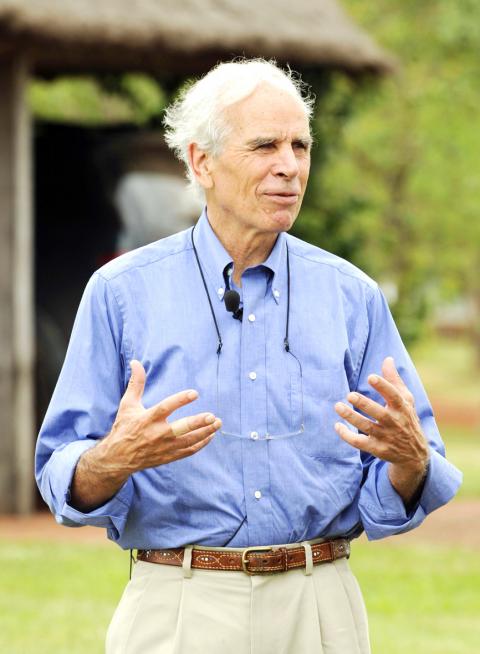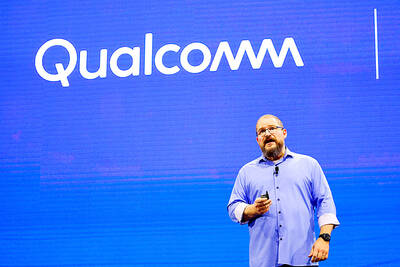Douglas Tompkins’ widow vividly remembers the suspicions the late billionaire raised when he started buying up land in Patagonia, the natural paradise at the bottom of South America.
Some accused him of preparing a storage site for US nuclear waste, she says. Others said he was starting a cult, still others that he wanted to launch a Jewish state — even though he was raised Episcopalian.
Now, just over one year after his death, she hopes her late husband’s final wishes for the land will lay the controversy to rest for good.

Photo: AFP
Tompkins, the co-founder of The North Face outdoor label and clothing brand Esprit, has donated a tract of land the size of Rhode Island to the Chilean government as a national park — the largest such donation in history.
This week, Chilean President Michelle Bachelet accepted the 407,000 hectare (one million-acre) donation in a ceremony held in a verdant Patagonian meadow and attended by Tompkins’ widow, Kristine McDivitt, a former CEO of the outdoor clothing and gear company Patagonia.
The ceremony came a year and three months after Tompkins’ death at age 72 in a kayaking accident in the Patagonia region he adored.
“Douglas Tompkins’ generosity and love of nature” shine through in his gift, Bachelet said on accepting the land on behalf of the Chilean state.
“If there were still any suspicions, with this gigantic donation they have been definitively left in the past,” said Chilean journalist Andres Azocar, who has written a biography of Tompkins called The Green Billionaire.
Much has changed in the quarter-century since Tompkins moved to Chile and started buying up huge swathes of land here and in neighboring Argentina.
The American magnate stoked controversy with his outsized ambition and ability to use his massive fortune to gobble up privately owned land in the remote southern region.
His plans to turn the land into national parks made him some powerful enemies in a Chile just emerging from the bloody 17-year dictatorship of Augusto Pinochet.
It was a time when the country was deeply suspicious of outsiders, especially from the US, which had backed Pinochet’s coup.
Tompkins’ opponents included former Chilean president Eduardo Frei, whose administration stalled him on his first initiative, the creation of Pumalin Park — a private nature reserve of 3,000 square kilometers in southern Chile.
And while the animosity faded over the years — the parks Tompkins created are today broadly hailed as an environmental and tourism boon in both Chile and Argentina — some still harbor lingering bitterness toward the late conservationist.
“He pressured landholders to sell their land at despicable prices,” Belisario Velasco, the deputy interior minister under Frei, said on Friday. “I don’t see the benefit of this deal for the state.”
Tompkins launched North Face as a mountaineering store in San Francisco in 1966.
He and his first wife, Susie Tompkins Buell, soon began selling quirky fashions that, in 1971, became the Esprit brand — today a hugely popular global chain.
Tompkins sold his stake in The North Face in the late 1960s and in Esprit in the 1980s.
The rugged, white-haired adventurer moved to Chile in 1990.
The controversy around him also extended to Argentina, where some accused him of buying up freshwater supplies for a future business venture.
“They’re accusing me of all kinds of things,” he told Argentine newspaper La Nacion in 2013. “I’ve already developed psychological armor against it. Sometimes it’s tragicomic. You have to have a good sense of humor and the skin of a hog: hard and leathery.”

Intel Corp yesterday reinforced its determination to strengthen its partnerships with Taiwan’s ecosystem partners including original-electronic-manufacturing (OEM) companies such as Hon Hai Precision Industry Co (鴻海精密) and chipmaker United Microelectronics Corp (UMC, 聯電). “Tonight marks a new beginning. We renew our new partnership with Taiwan ecosystem,” Intel new chief executive officer Tan Lip-bu (陳立武) said at a dinner with representatives from the company’s local partners, celebrating the 40th anniversary of the US chip giant’s presence in Taiwan. Tan took the reins at Intel six weeks ago aiming to reform the chipmaker and revive its past glory. This is the first time Tan

Qualcomm Inc is strengthening its partnerships with Taiwan Semiconductor Manufacturing Co (TSMC, 台積電) and original design manufacturers (ODMs) in Taiwan as it expands its presence in the artificial intelligence (AI) computer market, CEO Cristiano Amon said in Taipei yesterday ahead of the annual Computex trade show. “Historically we’ve always been a very big customer of TSMC, and we continue to be,” Amon said during a media Q&A session. “For chip manufacturing, we’re among the largest fabless [semiconductor designers],” he said, noting that Qualcomm, a leading provider of mobile and AI-enabled chipsets, ships about 40 billion components every year, with TSMC being

‘FAILED EXPORT CONTROLS’: Jensen Huang said that Washington should maximize the speed of AI diffusion, because not doing so would give competitors an advantage Nvidia Corp cofounder and chief executive officer Jensen Huang (黃仁勳) yesterday criticized the US government’s restrictions on exports of artificial intelligence (AI) chips to China, saying that the policy was a failure and would only spur China to accelerate AI development. The export controls gave China the spirit, motivation and government support to accelerate AI development, Huang told reporters at the Computex trade show in Taipei. The competition in China is already intense, given its strong software capabilities, extensive technology ecosystems and work efficiency, he said. “All in all, the export controls were a failure. The facts would suggest it,” he said. “The US

NEW PRODUCTS: MediaTek has been diversifying its product lines to minimize operational risks as mobile chips remain the company’s biggest revenue source MediaTek Inc (聯發科), the world’s biggest supplier of smartphone chips, yesterday said the tape-out process for its first 2-nanometer chip would take place in September, paving the way for volume production of its most advanced chip, likely to be its next-generation flagship smartphone chip, around the year-end at the earliest. MediaTek has been leveraging advanced process technologies from its foundry partner, Taiwan Semiconductor Manufacturing Co (TSMC, 台積電), to build its flagship mobile phone chips, a segment it once relinquished and then recovered four years ago as it released its Dimensity series. In the semiconductor industry, a tape-out refers to the